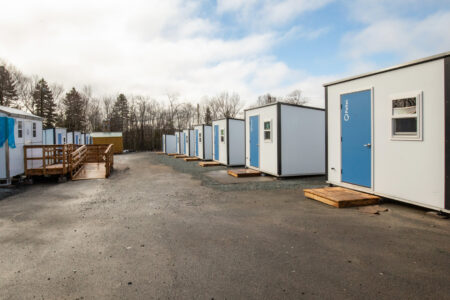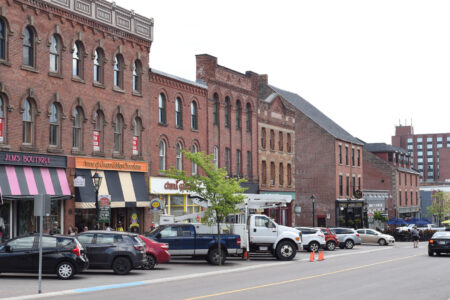
Shaun LaDue, a transgender man from Yukon, filed a human rights complaint earlier this month challenging a provision of the territory’s Vital Statistics Act (VSA). The VSA requires transgender individuals to undergo sex reassignment surgery before being permitted to change the sex-marker on their birth certificates. The mother of a transgender child filed a similar claim in May.
Following widespread media attention, LaDue’s case took an unexpected turn late last week. The Yukon government issued LaDue new documents with the proper sex-marker, although the statutory means through which these documents were issued remains unclear.
Courts and tribunals in Alberta and Ontario have declared similar surgery requirements to those contained in Yukon’s VSA discriminatory. In Yukon’s case, this means that a transgender person must have their “anatomical sex structure changed”, and provide two affidavits from medical practitioners confirming this change to the government.
Seeing the writing on the wall, British Columbia, Manitoba, and Nova Scotia voluntarily amended their legislation. Legal experts argue that these requirements violate the human rights and dignity of transgender Canadians, because they force individuals to undergo invasive surgery and, in many cases, sterilization in order to access basic identity documents that reflect their gender identity and gender expression.
While Yukon acknowledges that its laws are discriminatory – and is even willing to issue identity documents on a piecemeal basis – it is unwilling to amend its laws to provide a systemic remedy for all transgender Yukoners. This unwillingness is only highlighted by its haphazard approach that envisions transgender Yukoners appealing directly to the government to ask for an extra-statutory solution and gender affirming identity documents, neither of which have a clear basis in Yukon’s legislation.
Given the rapidly changing legal environment across the country, and the government’s own acknowledgment of its legislative shortcomings, why is Yukon lagging behind on transgender rights?
Yukon has long been a leader in recognizing the rights of gays and lesbians in Canada. In 1987, Yukon was one of the first governments to include sexual orientation in its human rights code, while in 1990, it became the first government to extend benefits to same-sex couples through its public sector collective agreements.
More victories followed, with Yukon leading Canadian jurisdictions, including changing the definition of “spouse” in its employment standards act in 1992, and then across its legislation in 1998 and 1999. Yukon was the fourth jurisdiction in Canada to legalize same-sex marriage following a successful court challenge in 2004. In 2014, the territory amended the VSA to “recognize same-sex partners as well as non-biological parents as parents on their children’s birth certificates – parental relationships that may result through natural conception or assisted reproduction.”
The progressive positions adopted by Yukon governments, from across the political spectrum, extend even to its schooling policy. In May 2012, the Department of Education passed a policy on sexual orientation and gender identity that recognized the presence of LGBTQ students and community members in Yukon schools and prohibited “homophobic and gender-based” discrimination and bullying.
Yukon moved quickly in 2012 to denounce a new anti-bullying policy in Whitehorse Catholic schools that described homosexuality as an “intrinsic moral evil” and “objective disorder.” Students and parents at Vanier Catholic Secondary School organized to demand that the policy be rescinded and that a gay-straight alliance be formed at the school. They were successful. Again, Yukon led the way.
This has not been the case for the rights of transgender Yukoners. Gender identity and gender expression are not expressly protected in the territory’s human rights code. In 2008, the Yukon Human Rights Commission recommended to the territorial assembly that its enabling legislation be updated to include gender identity as a protected ground of discrimination. The assembly declined to make this change.
The government’s position is that transgender rights are already protected by the code through the categories of sex and disability, even if they are not explicitly stated in the act.
The recognition of gender identity and gender expression has varied across the territorial North. The Northwest Territories, for example, was the first jurisdiction in Canada to include gender identity in its human rights code in 2002. In doing so, the Northwest Territories was ahead of the rest of Canada by a decade. Nunavut has yet to include gender identity and gender expression in its code, although transgender Nunavummiut are also likely protected under the sex and disability provisions of that territory’s act.
Elsewhere in Canada, gender identity and gender expression have been included in the human rights codes of Saskatchewan, Manitoba, Ontario, Nova Scotia, Prince Edward Island, and Newfoundland and Labrador. In Ottawa, despite several private member’s bills, the federal government has never successfully passed legislation expressly protecting the rights of transgender individuals.
Some movement has been made in Yukon towards affirming the human rights and dignity of transgender Yukoners. In the legislative assembly last April, NDP MLA Lois Moorcroft raised the issue of both the VSA and adding gender identity and gender expression to the territory’s human rights code. She introduced a motion to the assembly stating:
THAT this House urges the Government of Yukon to review, and introduce amendments to, the Human Rights Act, before the end of its current mandate, to protect the human rights of transgender people by adding “gender identity” and “gender expression” under section 7 of the Act as a prohibited ground for discrimination.
The next territorial election is expected in late 2016, leaving at least two legislative sessions for these amendments to be made. The government’s response to the motion, while deeply sympathetic to the discrimination faced by transgender individuals, was to introduce an amendment changing the timeline for reform from “the end of its current mandate” to “the next time it is reviewed.”
Yukon Party Justice Minister Brad Cathers noted repeatedly that the rights of transgender Yukoners, while not expressly protected by the act, where nonetheless covered by other provisions in the statute.
The assembly unanimously passed the motion as amended.
When asked about the VSA, however, Cathers stated that he was unaware of the gap in the legislation, but that it was something that should be studied further. Instead of committing to reform, the minister stated that if a transgender person was experiencing discrimination:
I would encourage them to avail themselves of the Human Rights Commission complaints process if they need to, but also, prior to that, consider that it might just require that they make someone else aware of the problem, whether it be senior managers, [the] Public Service Commission, the Yukon Employees Union or the minister responsible because, if someone is not following the intention of a policy, it may not be the view of others, but simply be through that person’s views or lack of understanding of the situation (Hansard, May 13, 2015: 6383).
The minister emphasized a personal commitment to “support full equality and respect for everyone.”
What should we make of the Yukon government’s mixed signals on this file? On the one hand, the government supported Moorcroft’s motion to affirm the rights of transgender Yukoners and the minister responsible spoke at length about his personal growth on transgender issues.
On the other, the government has adopted a position that individualizes the experiences of transgender people, placing the burden on them to educate the public, employers, and the government on now firmly established tenets of Canadian human rights law. Now we’ve learned that the government will recognize those rights, but only if transgender individuals make direct and personal appeals to the minister and public servants who are discriminating against them.
Yukon should provide its transgender community with systemic protections that place the burden on the government to uphold these rights, rather than the individual.
Affirming the human rights and dignity of transgender people in legislation is not an academic matter. It provides important protections and access to necessary services for one of our country’s most vulnerable groups. The Alberta Court of Queen’s Bench, for example, found that requiring surgery to obtain identification documents with the proper sex-markers violated section 15 of the Charter. It stated that:
Transgender persons encounter disadvantage, prejudice, stereotyping, and vulnerability because their felt sex is not the sex recorded at birth… The VSA birth registration system, and in particular the parts of it that relate to the issuing of birth certificates contribute to the disadvantage experienced by transgender persons by perpetuating the prejudice and stereotyping to which they are subject (paras. 58-9).
Transgender Canadians experience discrimination, violence, homelessness, and mental health issues at rates that far exceed the general population. When governments recognize this reality, as they have in Yukon, it is imperative that they act.
Simply stating that current human rights laws may protect transgender Yukoners is not enough. Placing the burden to challenge, overturn, or reform laws onto an already vulnerable group is unjust. One of the most pressing reforms the Yukon government should undertake is to update its VSA, bringing it in line with other provincial governments. Granting LaDue proper identification would be a hollow victory without comprehensive legislative reform.
Given its history of protecting the rights of LGBTQ communities in Canada, why is Yukon falling behind now?







